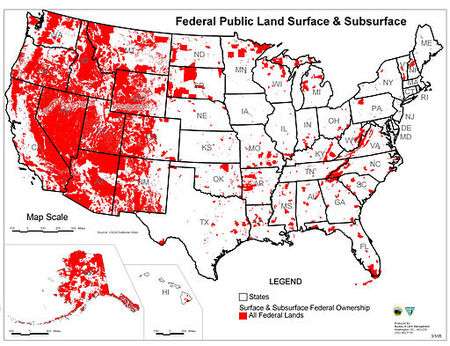Federal lands
Federal lands are lands in the United States for which ownership is claimed by the U.S. federal government, pursuant to Article Four, section 3, clause 2 of the United States Constitution.[1] The United States Supreme Court has repeatedly held that this section empowers Congress to retain federal lands, to regulate federal lands such as by limiting cattle grazing, and to sell such lands.[2] As of March 2012, out of the 2.27 billion acres in the country, about 28% of the total was owned by the Federal government according to the Interior Department.[3] The United States Supreme Court has upheld the broad powers of the federal government to deal with federal lands, for example having unanimously held in Kleppe v. New Mexico[4] that "the complete power that Congress has over federal lands under this clause necessarily includes the power to regulate and protect wildlife living there, state law notwithstanding."[1]
History
When Texas was annexed into the United States in 1845, it was able to "retain all the vacant and unappropriated lands lying within its limits".[5]
Primary federal land holders
- Department of the Interior
- Department of Agriculture
- United States Department of Defense
- Tennessee Valley Authority
Primary laws regarding federal lands
- Alaska National Interest Lands Conservation Act
- Alaska Native Claims Settlement Act
- Endangered Species Act (16 U.S.C. 1531 et seq.)
- Federal Land Policy and Management Act of 1976 (FLPMA)
- Federal Land Transaction Facilitation Act (Baca Act) (P.L. 106-248)
- Mineral Leasing Act
- National Environmental Policy Act (NEPA)
- Omnibus Public Land Management Act (Public Law 111-11)
- Taylor Grazing Act (43 U.S.C. 315 et seq.)
- Wild and Free-Roaming Horses and Burros Act of 1971
See also
- Crown Estate
- Article Four of the United States Constitution#Clause 2: Federal property and the Territorial Clause
References
- 1 2 Paul Rodgers, United States Constitutional Law: An Introduction (2011), p. 100-101.
- ↑ Gibson v. Chouteau, 80 U.S. 92, 99 (1872), U.S. v. Grimaud, 220 U.S. 506 (1911), Light v. U.S. 220 U.S. 523 (1911), Utah Power & Light Co. v. U.S., 243 U.S. 389, 405 (1917), Ashwander v. Tennessee Valley Authority, 297 U.S. 288, 336 (1936).
- ↑ Lipton, Eric, and Clifford Krauss, "Giving Reins to the States Over Drilling", New York Times, August 23, 2012. Retrieved 2012-08-26.
- ↑ Kleppe v. New Mexico, 426 U.S. 529 (1976).
- ↑ Joint Resolution for annexing Texas to the United States, J.Res. 8, enacted March 1, 1845, 5 Stat. 797. Joint Resolution for the admission of the state of Texas into the Union, J.Res. 1, enacted December 29, 1845, 9 Stat. 108.
Further reading
- Vincent, Carol H.; Hanson, Laura A.; Bjelopera, Jerome P. (December 29, 2014), Federal Land Ownership: Overview and Data (PDF), Congressional Research Service
- Wilson, Randall K. America's Public Lands: From Yellowstone to Smokey Bear and Beyond. Lanham, MD: Rowman & Littlefield Publishers, 2014.
